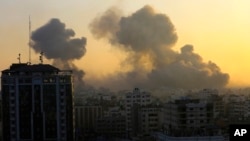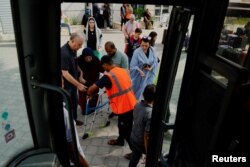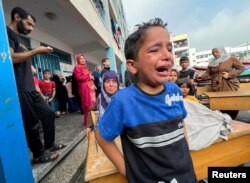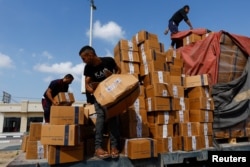Latest developments:
- Israeli ground troops advance toward Gaza City amid continued diplomatic efforts to bring about a brief stop in the fighting and a worsening humanitarian crisis in the Palestinian territory.
- U.S. President Joe Biden says 74 Americans were evacuated Thursday from Gaza to Egypt.
- UNRWA says in the past 24 hours, four of their shelters hosting about 20,000 Palestinians were hit in the Gaza Strip.
- U.N. expresses concern over deadly Israeli strikes around the Jabaliya refugee camp. The U.N. Human Rights office says, "we have serious concerns that these are disproportionate attacks that could amount to war crimes."
Israeli ground troops pushed toward Gaza City on Thursday amid continued diplomatic efforts to bring about a brief stop in the fighting and a worsening humanitarian crisis in the Palestinian enclave.
U.S. President Joe Biden on Wednesday urged a "humanitarian pause" in the war between Israel and Hamas militants. "A pause means give time to get the prisoners out. Give time," he said.
Hamas radicals took more than 240 hostages during its attack on Israel October 7 that killed 1,400 people. Israel declared war on Hamas after the attack and the constant bombardment on Gaza has killed thousands of Palestinians. The Hamas-run Palestinian health ministry says the death toll has surpassed 9,000.
The first group of foreign nationals, who have been trapped in the Gaza Strip since the start of the war, began entering Egypt on Wednesday. More left on Thursday.
Biden said during an Oval Office meeting with the Dominican Republic's president that 74 Americans with dual nationalities were evacuated from Gaza on Thursday.
His National Security Council spokesman, John Kirby, told reporters that five other Americans had crossed through Rafah on Wednesday. He said he hoped more could still enter Egypt on Thursday, adding the situation is fluid.
"That's a good sign that the trajectory is going in the right direction," Kirby said. "We want to get them all out as soon as possible."
He estimates there are between 1,000 to 1,200 dual U.S. nationals, legal permanent residents, and their families in Gaza.
The reopening of the Rafah border crossing to allow foreign passport holders to leave was part of a Qatari-brokered deal between Israel, Egypt and Hamas.
At least 81 injured Palestinians have also been transported by ambulance from Gaza to Egyptian hospitals as part of the deal.
U.S. Secretary of State Antony Blinken was headed Thursday to Israel and Jordan for meetings with officials, with no letup in hostilities in the region, as Israeli troops fought with Hamas militants on the edges of Gaza City.
"We're at the height of the battle. We've had impressive successes and have passed the outskirts of Gaza City. We are advancing," Prime Minister Benjamin Netanyahu said in a statement Thursday.
Civilians in the cross-fire
The U.N. agency that assists Palestinians said four of its shelters hosting around 20,000 displaced persons were hit in the past 24 hours. Two were in northern Gaza, which is under an Israeli evacuation order, and two in the southern part of the Strip.
"Today, a school-turned shelter was damaged at the Jabaliya refugee camp, the largest in the Gaza Strip, reportedly killing at least 20 people and injuring five," UNRWA Commissioner General Philippe Lazzarini said in a statement. "This comes after two days of heavy bombardments in the area."
Israel said it carried out airstrikes Tuesday on Jabaliya, targeting a senior Hamas commander. The camp was hit a second time on Wednesday. Hamas has denied the presence of any commanders at the camp and said 195 civilians were killed in the strikes.
Israel accuses Hamas, designated a terrorist group by the United States and other countries, of using civilians as shields and having a sprawling network of tunnels underneath Gaza, where it is believed to be stockpiling weapons, food and other supplies.
The U.N. human rights office said Wednesday that given the high number of civilian casualties and the scale of destruction following Israel's strikes on the camp that, "we have serious concerns that these are disproportionate attacks that could amount to war crimes."
Slow drip of aid
Israeli airstrikes on top of a blockade have led to a dire humanitarian crisis in Gaza.
Gaza's telecommunication and internet services were cut for about eight hours on Wednesday. It is the second time Israel has imposed a communications blackout in the past week.
Aid continued to trickle into Gaza, with 10 more trucks carrying water, food and medicine, but no fuel, arriving on Wednesday, bringing to 227 the number that have crossed since October 21. Israel has banned fuel, which it fears will be diverted by Hamas for its war machine.
The Turkish-Palestinian Friendship hospital in Gaza, which treats cancer patients, reportedly ran out of fuel on Wednesday and was forced to stop most of its work.
Philippe Lazzarini, commissioner general of UNRWA, the U.N. agency that assists Palestinians, visited southern Gaza through the Rafah crossing Wednesday. He is the most senior U.N. official to be allowed into Gaza since the war began.
He said Thursday that another two UNRWA staff had been killed in bombings, bringing to 72 the agency's losses since October 7. A disabled software developer in her mid-20s who was displaced from her home and killed in the Jabaliya camp with members of her family was one of the agency's latest confirmed casualties.
"How many more? How much more grief and suffering?" Lazzarini asked. "A humanitarian cease-fire is overdue for the sake of humanity."
Margaret Besheer at the United Nations contributed to this story. Some information also came from The Associated Press, Reuters and Agence France-Presse.








